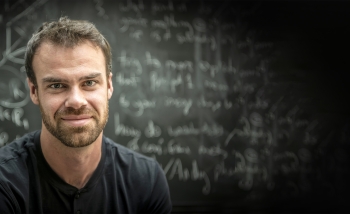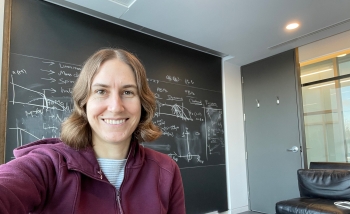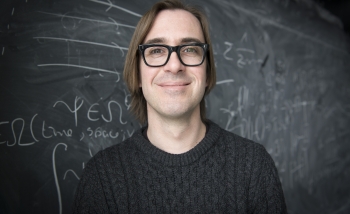La métrologie consiste à étudier l’étude la mesure. Il s’agit le monde des mètres, des grammes, des onces et des cuillères à café. Mais la métrologie quantique apporte des mesures de précision au monde microscopique de la physique des particules, en tirant parti des effets quantiques tels que l’intrication et la « compression quantique » pour améliorer la précision.
La métrologie quantique a déjà trouvé des applications dans les diagnostics médicaux humains et dans les horloges atomiques. Elle joue également un rôle clé dans l’amélioration de la sensibilité des détecteurs d’ondes gravitationnelles révolutionnaires comme le LIGO (l’observatoire d’ondes gravitationnelles par interféromètre laser).
« Je suis impatiente de voir d’autres applications pratiques de la métrologie quantique à l’avenir. Nous voulons améliorer la sensibilité d’un signal, non seulement en principe, mais aussi dans la pratique », déclare Zhou.
Les perspectives d’un avantage quantique, c’est-à-dire d’une amélioration par rapport aux techniques classiques, en métrologie sont passionnantes. Chaque avancée progressive a un effet notable. Le succès ne signifie pas nécessairement la perfection, mais plutôt un continuum où l’on peut progressivement améliorer la précision.
« Tant que les performances de la sensibilité la plus élevée que vous pouvez obtenir sont meilleures que le cas classique, alors vous avez démontré l’avantage du quantique. Cette perspective place la démonstration de l’avantage quantique en métrologie dans une position favorable », déclare Zhou.
Pour réaliser ces améliorations, Zhou s’attaque à l’un des principaux obstacles auxquels se heurte la recherche en information quantique soit comment corriger le « bruit » et la décohérence. Les systèmes quantiques sont fragiles, ce qui entraîne le même obstacle pour toutes les applications quantiques, de la métrologie aux communications en passant par l’informatique. La modification ou l’obscurcissement des informations d’un système quantique peuvent résulter de toute interaction avec le monde extérieur.
La solution à ce problème est la correction d’erreurs quantiques.
Dans le domaine de la technologie quantique, vous ne pouvez pas simplement sauvegarder des informations en les copiant, tout comme vous le faites avec un ordinateur classique. Plutôt que cela, vous devez recourir l’intrication quantique pour connecter les informations stockées sur une partie du système quantique à de nombreuses autres parties. Ainsi, si un (qu)bit d’information est perdu, il peut être récupéré par ses partenaires intriqués.
« Vous pouvez utiliser la correction d’erreur quantique pour améliorer la métrologie quantique », explique Zhou. « Si le code de correction d’erreur quantique est suffisamment bon, vous pouvez atteindre une sensibilité très élevée dans un scénario de métrologie. »
Cependant, la relation entre la correction d’erreur et la métrologie est mutuellement bénéfique, car la compréhension des limites théoriques de la métrologie quantique peut également nous permettre de tester l’efficacité de nouveaux codes de correction quantique.
Les recherches de Zhou ont des implications multidisciplinaires. C’est ce qui l’a incitée à s’intéresser à ce sujet en premier lieu, en combinant ses intérêts pour la physique, les mathématiques et l’informatique pour résoudre des problèmes dans un large éventail de domaines.
« Tous les sous-domaines de la science de l’information quantique ont connu un développement rapide récemment. La métrologie quantique va devenir de plus en plus utile parallèlement au développement de l’informatique quantique et de la communication quantique », déclare Zhou.
Zhou a obtenu son doctorat à Yale en 2021 et a rejoint l’Institut Périmètre après un stage postdoctoral de deux ans pour étudier la métrologie quantique et la correction d’erreurs à Caltech. Aujourd’hui, Zhou est dans l’attente avec impatience de nouvelles avancées dans l’environnement collaboratif de l’Institut Périmètre.
« J’ai hâte de commencer et de collaborer avec les autres professeurs, postdoctorants et étudiants qui étudient l’information quantique », dit-elle.
À propos de l’IP
L'Institut Périmètre est le plus grand centre de recherche en physique théorique au monde. Fondé en 1999, cet institut indépendant vise à favoriser les percées dans la compréhension fondamentale de notre univers, des plus infimes particules au cosmos tout entier. Les recherches effectuées à l’Institut Périmètre reposent sur l'idée que la science fondamentale fait progresser le savoir humain et catalyse l'innovation, et que la physique théorique d'aujourd'hui est la technologie de demain. Situé dans la région de Waterloo, cet établissement sans but lucratif met de l'avant un partenariat public-privé unique en son genre avec entre autres les gouvernements de l'Ontario et du Canada. Il facilite la recherche de pointe, forme la prochaine génération de pionniers de la science et communique le pouvoir de la physique grâce à des programmes primés d'éducation et de vulgarisation.
Ceci pourrait vous intéresser



